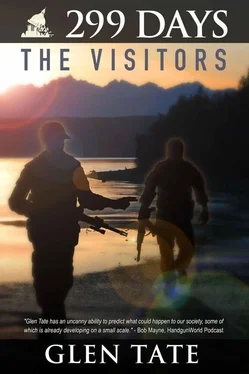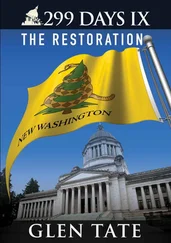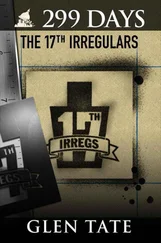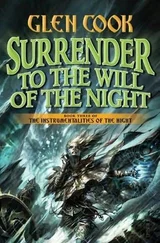“How about the government services they seem to have up and running?” Ted asked. Green Berets didn’t just talk about the “gun stuff”; there were lots of other components to an effective indigenous unit. “A library, postal service, and a makeshift court?” Ted said. “A food hall, an Ag department, a couple squads guarding the gate with an Air Force Security Forces guy running that? Taking down a meth house with an amateur SWAT team? A newspaper? A frickin’ newspaper? Called the ‘Patriot’ and everything? What a solid base of operations. You think they will get the Undecideds to come over to our side?”
“Hard to say with certainty,” Sap said, “but I think they have all the foundations laid for at least most of the population to support them. If they can feed and protect people, and the former government can’t—and we know they can’t—then probably people will side with us. I worry about the Loyalists they identified. Grant didn’t want to eliminate them. That’s a sign of a weak leader. He hesitates to do what’s necessary. He’ll need our guidance on that. We can always take care of the threat ourselves,” Sap said.
“Roger that,” Ted agreed. He had been thinking the same thing. Ted would give Grant a chance to do it himself. If Grant choked, the green team would take care of business. They would use that as a teachable moment for Grant, showing him what needed to be done and shaming him for not doing it. This was standard for how they dealt with wavering indigenous leaders and the elimination of collaborators and spies. But, Ted had to admit, they’d never had to do it against Americans. That was new.
“What do you think about Grant doing civil affairs for battalion?” Ted asked Sap. “Battalion” referred to the special operations group at Boston Harbor.
“It’s highly unorthodox,” Sap said. “He’s not trained. But, hell, no one’s trained for these things anymore. All our civil affairs nerds are still back at their Loyalist jobs so we have no choice. He has a track record out here in a little place. Could he replicate that in a bigger place? We could see. But he’s better than nothing.”
Ted decided that he’d recommend to Lt. Col. Hammond that Grant serve as the civil affairs officer. No one had expected to find a civil affairs person in a group of hillbillies. It was an unexpected find.
Ted and Sap were getting near their destination. Boston Harbor was a few miles north of Olympia on the water, a tip jutting out into Puget Sound with a big marina. It was a very strategic location that the Loyalists hadn’t figured out. They never expected the Patriots’ special operations command to be operating semi-openly in a little town so close to their state capitol. But they were; hidden in plain sight.
Boston Harbor was an unusual place in western Washington: it wasn’t full of left-wing kooks. For whatever reason—probably all the military people who retired there from nearby Ft. Lewis—Boston Harbor was actually pretty conservative.
Another factor was that right before the Collapse, the state environmental department declared that most of the homes on the water in Boston Harbor needed to be removed to save some snail. The locals didn’t appreciate that too much. Tensions between the government employees living there and the private sector residents ran very high. Early on in the Collapse, the leaders of Boston Harbor told the Loyalist public employees to leave. They threatened to burn down Loyalists’ houses. The Loyalists got the message and left in droves. They could live safely in nearby Olympia with their government colleagues. There were far too many arsons for the authorities to investigate. The Loyalist authorities didn’t have the time to worry about little Boston Harbor. They would let those right-wing nut jobs run their own little community.
So the Patriots did. Given how close they were to the capitol, which was still firmly held by the Loyalists, the Patriots were careful not to overtly strut around Boston Harbor with Don’t Tread on Me flags. There could be some remaining Loyalists who might rat them out. But the comings and goings of so many military men and women and their civilian friends was an open secret. The other open secret was that the Loyalists lacked the resources to do anything about it. They had big populations to control in the cities. That was all they could do. No one cared about Boston Harbor.
It was almost dark as Ted and Sap were pulling into Boston Harbor. They had left Pierce Point just in time. They slowed down as they got to the floating checkpoint. That was a “fishing vessel” that was really a Patriot naval observation post. Sap got his radio and called in the appropriate code. The response came back that they were cleared to pass. They were going slowly now.
As Ted and Sap pulled into the Boston Harbor marina, Ted said to Sap, “Let’s go tell Lt. Col. Hammond about the good folks at Pierce Point.” Sap smiled.
Chapter 167
Lives, Fortunes, Scared Honor
(July 3)
After Ted and Sap left the yellow cabin, there wasn’t a lot to say. The Team was pretty much silent. They all realized the magnitude of the decision they’d just made. But…they also realized that they had a date with some lovely girls. They’d earned that. They were single and in their twenties. Some things were more powerful motivators than the gravity of life-altering decisions.
Grant knew that he needed to take care of his guys. A good leader does that. He remembered the scene from Apocalypse Now when the commander of an American unit rewarded a brave helicopter crew by saying into the radio, “I’ll get you a case of beer for that one.” That’s what you did. You took care of your guys.
“Hey, you gonna text those girls?” Grant asked the Team. Phones came flying out and fingers and thumbs texted furiously. Smiles abounded.
“Not a frickin’ word to them, understand,” Grant said. They all nodded. “Seriously. Ted can, and will, kill you. He’ll kill your girlfriend for good measure.” Grant wasn’t kidding and they knew it.
“I’ll ask Gideon if a couple of you can have the keys to the night guard cabin,” Grant said. “He’ll be working tonight so he won’t need it.” The guys were glad that Grant was thinking of things like that for them.
“Roger that,” Pow said. “Who wants to join me in the night guard cabin?”
“Hey, ask the girls if they have any hot moms,” Chip said. He wasn’t kidding.
“Or grandmas,” Scotty said. Everyone laughed.
These guys had never been closer than they were right then. They had just signed their lives away. They would be together in the one thing that brought men together more closely than anything else: a small unit that was sure to see action. They would be brothers in arms for the rest of their lives. There was no closer bond. The hot chicks on their way weren’t even a close second.
Grant and Chip wished the guys success in their pursuits that night. They left the yellow cabin. Then Grant remembered something.
“Those guys have protection?” Grant asked Chip. “I don’t want my Team to be disabled from some disease.”
Chip nodded. “Roger that. Taken care of. I have a small supply,” he said with a grin. “Thought I might need them, but…those brothers need them more than an old guy like me. If those girls keep coming over, we’ll need to get some more or figure something out. I dealt with this in ‘Nam,” said Chip the former supply sergeant. “We came up with some workarounds.”
After they had gone the few yards to Grant’s cabin, Chip kept going down Over Road to the Morrell’s cabin where he stayed. He pointed back to the yellow cabin, shook his head, and said, “Kids.”
“Yep. Like we used to be,” Grant said. Chip just nodded and headed down the gravel road toward the Morrell’s and Grant started walking toward his cabin. For the first time all day, he realized how tired he was. What a day. Talking to dozens of people, organizing tons of things, and joining a Patriot guerilla unit. Could he be more tired?
Читать дальше











